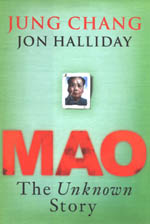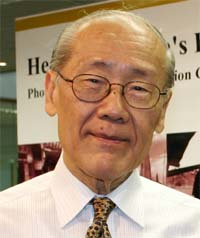Mao: The Unknown Story / Jung Chang and Jon Halliday
Speaker: Professor Wang Gungwu
Date: 17 November 2004 (Thursday)
Time: 7:15 - 9:00 pm
Venue: 1/F, Main Library New Wing
Language: English
About the Books
 Mao: The Unknown Story / Jung Chang and Jon Halliday
Mao: The Unknown Story / Jung Chang and Jon Halliday
Based on a decade of research and on interviews with many of Mao's close circle in China who have never talked before--and with virtually everyone outside China who had significant dealings with him--this is the most authoritative life of Mao ever written. It is full of startling revelations, exploding the myth of the Long March, and showing a completely unknown Mao: he was not driven by idealism or ideology; his intimate and intricate relationship with Stalin went back to the 1920s, ultimately bringing him to power; he welcomed Japanese occupation of much of China; and he schemed, poisoned and blackmailed to get his way. After Mao conquered China in 1949, his secret goal was to dominate the world. In chasing this dream he caused the deaths of 38 million people in the greatest famine in history. In all, well over 70 million Chinese perished under Mao's rule--in peacetime.
Combining meticulous research with the story-telling style of Wild Swans, this biography offers a harrowing portrait of Mao's ruthless accumulation of power through the exercise of terror: his first victims were the peasants, then the intellectuals and, finally, the inner circle of his own advisors. The reader enters the shadowy chambers of Mao's court and eavesdrops on the drama in its hidden recesses. Mao's character and the enormity of his behavior toward his wives, mistresses and children are unveiled for the first time.
This is an entirely fresh look at Mao in both content and approach. It will astonish historians and the general reader alike.
(FROM THE PUBLISHER)
About the Speaker
 Professor Wang was Vice-Chancellor of The University of Hong Kong from 1986 to 1995, and was Chairman of The Institute of East Asian Political Economy (1996-1997) before it was reconstituted as The East Asian Institute. He is also Faculty Professor, Faculty of Arts and Social Sciences, National University of Singapore (NUS), and Emeritus Professor, Australian National University, Canberra.
Professor Wang was Vice-Chancellor of The University of Hong Kong from 1986 to 1995, and was Chairman of The Institute of East Asian Political Economy (1996-1997) before it was reconstituted as The East Asian Institute. He is also Faculty Professor, Faculty of Arts and Social Sciences, National University of Singapore (NUS), and Emeritus Professor, Australian National University, Canberra.
He holds many appointments and awards, among which include:
In Singapore, Chairman, Board of Trustees, Institute of Southeast Asian Studies; Chairman, The Advisory Committee on Chinese Programmes (ACCESS), MITA President, Tan Kah Kee International Society Member, Board of Governors, Institute of Policy Studies; Vice-Chairman, Board of Governors, Chinese Heritage Centre; Member, Board of Governors, Institute of Defence and Strategic Studies, Nanyang Technological University; Advisor, National Heritage Board.
Outside Singapore, Chairman, International Advisory Council, Universiti Tunku Abdul Rahman (UTAR); Fellow, Australian Academy of the Humanities (President, 1980-1983); Foreign Honorary Member, American Academy of Arts and Science; Member, Academia Sinica, Taipei; Honorary Research Fellow, Chinese Academy of Social Sciences, Beijing; Co-Patron, AsiaLink, University of Melbourne; Chairman, Board of Governors, Asia Scholarship Foundation, Bangkok; Board Member, Social Science Research Council, New York; Member, Advisory Committee, Cambridge University East Asia Institute; Member, International Advisory Board, Institute of Asian Research, The University of British Columbia, Member, China Research Institute, School of Oriental and African Studies, London.
He is also member of Editorial Board or Advisory Editor of many international journals, including Journal of Southeast Asian Studies, The China Journal, The China Quarterly, Modern Asian Studies, Japanese Journal of Political Science, China Studies, Pacific Affairs, The Pacific Review, China: an International Journal, Contemporary Southeast Asia, The Round Table, Asian Studies Review, Asian Culture, and Journal of the Malaysian Branch, Royal Asiatic Society.

